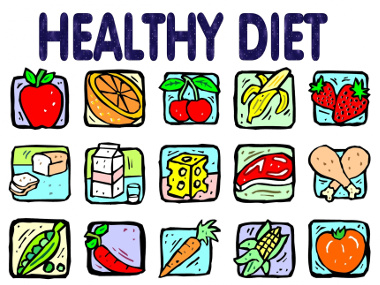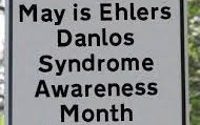Trust – and heal – your gut!

You may have noticed I don’t give much dietary advice here. In fact, to this point, I’ve given virtually none.
And this is for a very good reason: just like medications and just about everything else with Ehlers-Danlos Syndrome with a dose of Mast Cell Activation Disorder on the side (any flavor) among plenty of other comorbidities (leaky gut, IBS, more): it’s as individual as fingerprints.
The only advice I will give everyone, with EDS or not is to eat as whole, organic and unprocessed of foods as possible. Or as Sean Croxton shared once, “JERF”: Just Eat Real Food!
This is good for everyone naturally. But it’s exceptionally good for us, as we seem to be even more sensitive to all the additives and complex ingredient lists in processed and GMO foods. And thanks to likely common leaky gut and our trippy mast cells, we’re going to react to a lot more things than the average bear, even if we don’t realize it yet. (This can also lead to secondary autoimmune diseases which are often diagnosed first.)
Yes, I know this is hard, nay, seriously labor intenstive. Trust me, this takes the bulk of my own personal time, cleaning and cooking whole foods almost without exception. Yes, it was uber painful (and still is) when I started to do so in 2013. (I actually did the GAPS diet for 3 months, then modified it to a low-trigger paleo version that’s sustainable for me just barely out of my wheelchair.)
And I live alone – no kitchen elves or help anywhere! (I keep looking.)
But I’ve never done better than since I did adopt this practice, even though it’s seriously exhausting at times. The lower histamine levels and improved nutrition it gives me have only helped, and kept me out of the hospital and away from my epi-pen all this time, yay. I can still go down if enough other triggers pile on now: scents, stress, heat, cold, vibration, meds. But I react a lot more mildly than those who don’t watch their diets.
Further, I hesitate to give anyone any “safe” lists of foods: thanks to our usually over active mast cells, my “safe” food may just trigger you and vice-versa. Conversely I won’t give out any lists of foods to “avoid” (other than processed foods and sugar, period), because we all need to keep our nutrition up as much as possible, and what’s bad for me, may not trigger or cause you any trouble at all.
The only exception I might make would be to suggest eating “low histamine” categories of foods. But even this is a red herring, since technically any food that triggers YOUR mast cells is high histamine, since that’s what our mast cells release when activated. (Quickly or slowly.) That said, many find avoiding ground meats, fish and leftover foods to help lower their overall reactions, but again, listen to your body and eat what works best for you (causes the fewest reactions/lowest inflammation) regardless of any “lists” or advice you find.
The other problem with low histamine food lists is that if you have leaky gut, virtually every food you eat has the potential to trigger you and therefor increase your histamine levels, since you are passing over-sized molecules of it that your body doesn’t recognize well and may consider a foreign invader worth reacting to. So it may pounce on a perfectly innocent lentil when you normally have no trouble with lentil protein. Voila, we produce histamine again from the over-active mast cells that encounter it and are set off by IgG.
And you can often eat more when you’re less stressed or excited than not. I stopped getting esophageal spasms once I removed more stress from my life and slowed down. And I still eat many of the same foods that triggered me before, but spasm-free. Funny how that works…
Why go needlessly limiting your diet because you read a list of foods in a certain group somewhere and eliminate the whole category before you even see if it’s a problem? (Common examples are lists of salycilates and oxalates.) I’ve found this kind of knee-jerk reaction most common in those with the traits of ADD/ADHD for what it’s worth – leaping to conclusions, and catastrophic thinking come much too easily to us, myself included. Wait and see and:
Trust – and heal – your gut, I say!
Not anyone else’s! Yes, you may have a problem with some of these foods, but test first (carefully of course, especially if you’re a shocker or have true IgE-mediated allergies) before doing a wholesale elimination of an entire category. Sometimes it’s not the food you reacted to but its packaging, age, terroire, or variety. Or its food source – what did the chicken eat? Seriously.

And be careful not to accidentally blame a food if it turns out you’re reacting to scents or chemicals as I just did with fluoride and chlorine this past year. Though usually those will cause a general increase in overall inflammation and trouble eating most all foods (I lost several pounds before I figured this out, I’m just now regaining).
I innocently blamed some foods I ate after swimming a couple of times when it turned out to be the chlorine from the pool to blame for my increased reactions and inflammation at the time. Though I’ll confess I had trouble eating almost anything at all from my constantly increased gut inflammation – big flag in hindsight. Yes, tricky!
Of course, if you do find a whole category (e.g. oxalates or salycilates or corn) to trigger you, then listen to your body. But try not to needlessly narrow your diet before you have to just because someone else did or says to. We need all the nutrition we can get!
And frankly, if I listened to all the nutritional advice I’ve gotten in all the online groups I’m in, I’d be eating only air – no kidding! Pass me my tray of filtered ice please… though I will take some salt with that, smile.
Use your judgement, work with a chosen doctor, naturopath, dietician or nutritionist. However, if you are trying to gain weight thanks to our various comorbidities, do not let them talk you into eating “all the sweets and ice cream you want” just to lay on weight. That is not a wise move.
Sugar is one of the only truly universally toxic foods for everyone, but especially so for EDS patients due to the increased inflammation it drives among other things including our pain levels. (Truly!) Some of us even react to sugar, go figure. (I do for one.) It also lends hugely to gas and bloating from chronic candida and SIBO which can eventually turn into oral thrush thanks to our thrashed immune systems from often comorbid CVID already failing to fight it off.
Ask them for help finding a nutritious way to gain that weight. And see if a naturopath or functional medicine doctor can’t help you reverse the weight loss due to some possibly hidden nutritional imbalance in the first place. (I know, sometimes it’s from neurologically driven gastroparesis which makes this really hard. But you know who you are.)
And for those trying to lose weight, please know that skimping on calories or food quantity doesn’t usually work. It’s best to eat a normal amount (as tolerated) of nutrient dense foods. We’re finding sugar and carbs in processed foods to be the real villain here again, much more than natural saturated fats with the animal it came on. Food, especially sugars can even impact our mood.
And I’m finding a lot of us show signs of adipose tissue (aka fat) disorders including both the better known lymphedema often driven by our comorbid MCAD, and the much less well known, but maybe not so rare either lipoedema – which can make it virtually impossible to lose much to any weight at all even if you’re still active. (I have a dear friend who suffers terribly from it, and has tried absolutely everything except surgery – it doesn’t work. And we’re not good surgery candidates, alas.)
It’s sometimes spelled lipedema, I think mostly in the US. And upon inquiring in the groups once with a general description, no surprise several people felt this described them to a T. (Lipomas anyone?) So please know, you are not alone out there with the weight gain battle and EDS! Some people also find their weight swings widely – from over to under weight and back again for as yet unknown reasons, though some may include endocrine imbalances. Yes, crazy-making! (Like I said elsewhere, we put the “syn” in Syndrome!)
This article about collagen and metabolic disorders may help explain this a bit, including our proclivity to diabetes, fatty liver disease and elevated liver enzymes. Remember what I said about falling down the rabbithole? It really never ends!
So many issues, so little time! But that’s the kind of havoc this faulty collagen disorder wreaks. Again, the sooner the medical establishment can wrap their collective brain around this massive syndrome, the better. But keep chipping away, one doctor and family member at a time.
Meanwhile, keep your nutrition up as best you can, and stay active at whatever level you can manage. Trust me, I know how little that can be too sometimes. I was once bed bound. But I climbed back out – slowly, but surely. One day, meal, and Vitamin C supplement at a time.
Some good sites on healing EDS to varying degrees via nutrition to inspire your healing journeys further:
- Deborah Cusack’s family healing story
- Sandy Simmons Connective Tissue Nutrition site
- Mysti Reutlinger’s great book Journey to Health
To your health,
Jan (sans PB) December 2015



Ah, light bulb moment! I was just telling Heather after the mast cell video that in high school my stomach would hurt when I was tired, feel better if I laid down, and hurt if I got back up without sleeping. But I also eventually figured out that sugar made it worse, too…
Happy to help connect some dots! Yes, sugar is pretty much bad for everybody, but especially us, and doesn’t help with our gut biomes, causing lots of dysbiosis which lends to the (often already) leaky gut. Good luck!
The Low Histamine Chef Yasmina Ykelenstam had some good success here too, and ties leaky gut to mast cells as I do:
http://thelowhistaminechef.com/leaky-gut-the-mast-cell-histamine-crohns-disease-connection/